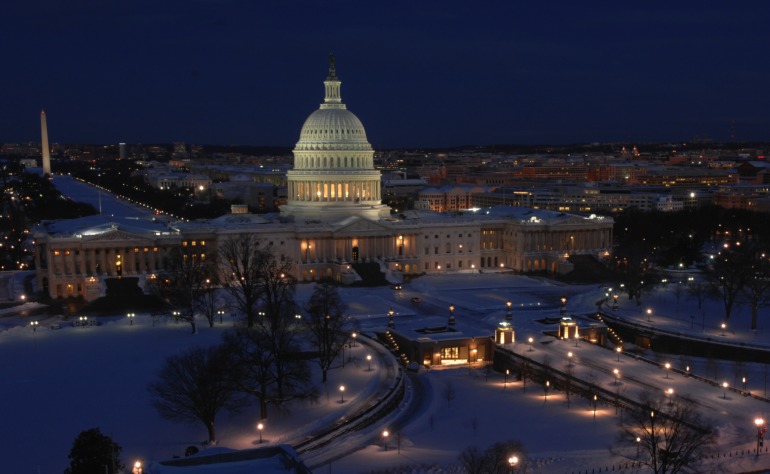Newsletter
Mar 12, 2020
Seyfarth Policy Matters Newsletter - March 12, 2020
Coronavirus and Sick Day Legislation. Hard on the heels of the President’s address yesterday, and the WHO declaration that the Coronavirus is now an international pandemic, there is obviously too much to report that could be covered here on the issue generally. We do note that Seyfarth has a task force on the issue and has prepared a “go to” website to help answer your compliance questions. Building on the crises, there was a Wednesday hearing before the House Subcommittee on Workforce Protections focused on the need to swiftly enact the Healthy Families Act (H.R 1784), which requires employers, with 15 or more employees, to allow workers to accrue seven days of paid sick leave up to 56 hours per year. Rep. DeLauro (D-CT) and Sen. Murray (D-WA) also introduced a bill on March 6 which would build on the Act by adding an additional 14 days available immediately in the event of any public health emergency, including the current Coronavirus crisis. Today, the House is scheduled to take up H.R. 6201, the Families First Coronavirus Response Act, which basically adopts the Healthy Families Act as well as the 14 day addition from the DeLauro/Murray bill--but note that the employer thresholds have been changed to replicate those under the FLSA. The 14 days would be in addition to the seven. The bill includes many provisions beyond employment. Due to opposition on various grounds, including the haste with which it was brought to the Floor and the fact that many provisions sweep beyond providing remedies for problems raised by the Coronavirus, Capitol Hill is now engaged in negotiations to arrive at a bipartisan solution. Senate Leader McConnell has agreed to bring the Senate back next week if necessary to pass a bill. As the federal government debates appropriate responses to COVID-19, Colorado has pushed ahead with a paid sick leave mandate of its own, which Seyfarth Shaw wrote on here. We should know more tomorrow and stay tuned for further developments and a new bill.
NLRB Election Rule. In a shocker move, the AFL-CIO has asked the D.C. District Court to issue a preliminary injunction enjoining the recently issued NLRB election rules, both on APA procedural and substantive grounds. The case is AFL-CIO vs. NLRB, D.D.C, No. 20-0675, motion for injunction, March 9, 2020.
EEOC Tightens up the Ship. Following up on its repeal of its 1997 long-standing, but grossly inconsistent with case law, policy barring employment arbitration, the Commission has at long last reasserted its control over litigation through repealing its delegation of authority, effective March 10, to the General Counsel (GC) and by asserting control over review of amicus briefs. Under this policy, the GC must inform the Commission whenever a court requests an amicus brief from the agency.
Chair of Senate Judiciary Committee States Intention to Address Ongoing Judicial Emergencies. On February 13, 2020, this newsletter issued an update concerning Federal Judge Dale Drozd’s new civil standing order, addressing what he termed a “Judicial Emergency.” At the time, we wondered whether that remarkable order would motivate Congress to act. That question may have been answered quicker than anticipated. Specifically, Senator Lindsey Graham (R-SC), Chair of the Judiciary Committee, recently announced that he intends to introduce legislation appropriating a batch of new federal judgeships across the country. Senator Graham stated he sees the need for additional judgeships in light of the many judicial “emergencies [that have] been declared in the Country.” According to Senator Dianne Feinstein (D-CA), "[t]hat would be very good," and she expects other Democrats would support the measure. It should be noted that even a bipartisan bill would face an uphill battle in light of the upcoming Presidential election. Moreover, Senator Graham has only issued a “statement” about the need for potential legislation, and met with staff regarding the same. But, even though this legislation is currently only hypothetical, Senator Graham’s statement of intention underscores the importance of this somewhat under-the-radar issue.
IRS Issues Much-Needed Coronavirus Testing Guidance for Employers Administering High Deductible Health Plans (HDHP). On March 11, 2020, in response to wide-spread employer confusion, the IRS released Notice 2020-15, which provides that a health plan will not lose HDHP status, and its concurrent tax benefits, “merely because the health plan provides health benefits associated with testing for and treatment of COVID-19 without a deductible.” Typically, a covered person under a (HDHP) cannot access medical services covered under the plan before satisfying his or her deductible. This guidance would carve out an exception for COVID-19. For a more detailed analysis of the guidance, please visit Seyfarth Shaw’s benefits and ERISA blog here.

